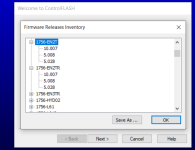jakeparsons03
Member
Hello,
I got some second hand 5069 cards to use as temporary cards until Allen Bradley shortages are over. They will be going in the same PLC but they have different firmware versions (2.014 vs 3.014) . Does it really matter if thats the case? I assume I can just upgrade one of the cards firmware to match the rest, I have just never had to do that before and want to make sure I am right before I break open the factory seals.
I got some second hand 5069 cards to use as temporary cards until Allen Bradley shortages are over. They will be going in the same PLC but they have different firmware versions (2.014 vs 3.014) . Does it really matter if thats the case? I assume I can just upgrade one of the cards firmware to match the rest, I have just never had to do that before and want to make sure I am right before I break open the factory seals.



